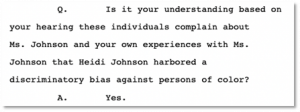Passed 50 years ago in June, Title IX has had a profound and widely-recognized impact on girls’ and women’s sports. But Title IX did not only offer parity in sports. It has been instrumental in compensating victims of discrimination and harassment by teachers, coaches, professors and other students. Until now. The Supreme Court quietly eviscerated this right just before Title IX’s anniversary, with little fanfare or public outrage. In a decision superficially limited to the Rehabilitation Act and the Affordable Care Act, the Court eliminated damages under Title IX – and Title VI — for emotional distress.
Victims of sex and gender-based discrimination and harassment have successfully used Title IX to obtain relief when recipients of federal funds have failed to enforce the law. In Hawaii, for example, a jury awarded $810,000 after a ninth-grade girl with the intellectual ability of a second grader was raped by an older boy from her class. The girl’s mother previously had expressed concerns to the school about this student. In California, a male student was alleged to have pressured a middle school girl into sending nude pictures and used those pictures to blackmail her into performing oral sex; students then posted pictures on social media of the female student performing oral sex. She obtained a $2 million dollar settlement. In Florida, a jury awarded a single plaintiff $6 million dollars after a teacher sexually abused her during her junior and senior years in school. The abuse included child pornography and forcible kissing and touching. The school had previously received reports of sexual abuse but failed to investigate. In Colorado, a school district settled a claim for $5 million dollars. A teacher was alleged to have sexually abused a student when she was nine years old. The school knew the teacher had a history of inappropriate conduct but failed to act to prevent the abuse. Based on the Supreme Court’s recent ruling in Cummings v. Keller Premier Rehab, were claims like those brought today under Title IX, there could be no award for their depression, their suicide attempts, their eating disorders, their missed classes, their trauma.
In 1972, Congress enacted Title IX so that federal funds would not support discriminatory practices. The law bars educational programs or activities that accept federal funds from engaging in discrimination on the basis of sex. In other words, schools must take action to prevent and address sexual harassment and discrimination. Failing to do so could lead to the loss of important federal dollars (although in reality, that rarely if ever happens). Title IX was patterned after Title VI of the Civil Rights Act of 1964, which prohibits discrimination by funding recipients with respect to race, color and national origin. Although neither statute expressly provides victims of discrimination with the right to sue in court, in 1979, after a female student alleged she was denied admission to medical school because of her sex, the Supreme Court held in Cannon v. University of Chicago, that Title IX (and Title VI) allowed her to sue in court. Over a decade later, in 1992, when a high school student sued alleging her teacher had sexually harassed and abused her, the Court confirmed that the right to bring suit included the ability to obtain money damages. This apparent expansion of rights may have peaked in the mid-90s: soon after, in its 1998 decision Gebser v. Lago Vista Independent School District,, the Court restricted when schools could be held liable for harassment.
 Sexual Harassment Lawyer Blawg
Sexual Harassment Lawyer Blawg



